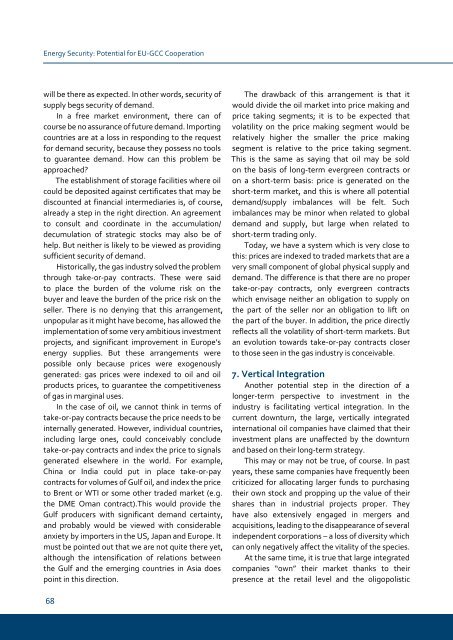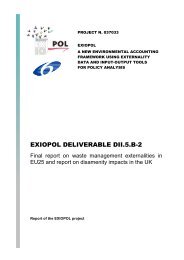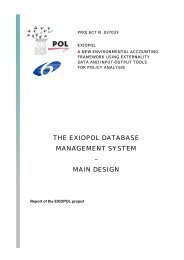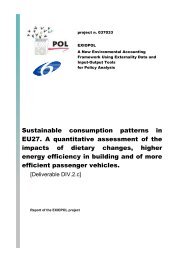Gulf and European Energy Supply Security - Feem-project.net
Gulf and European Energy Supply Security - Feem-project.net
Gulf and European Energy Supply Security - Feem-project.net
Create successful ePaper yourself
Turn your PDF publications into a flip-book with our unique Google optimized e-Paper software.
<strong>Energy</strong> <strong>Security</strong>: Potential for EU-GCC Cooperation<br />
will be there as expected. In other words, security of<br />
supply begs security of dem<strong>and</strong>.<br />
In a free market environment, there can of<br />
course be no assurance of future dem<strong>and</strong>. Importing<br />
countries are at a loss in responding to the request<br />
for dem<strong>and</strong> security, because they possess no tools<br />
to guarantee dem<strong>and</strong>. How can this problem be<br />
approached?<br />
The establishment of storage facilities where oil<br />
could be deposited against certificates that may be<br />
discounted at financial intermediaries is, of course,<br />
already a step in the right direction. An agreement<br />
to consult <strong>and</strong> coordinate in the accumulation/<br />
decumulation of strategic stocks may also be of<br />
help. But neither is likely to be viewed as providing<br />
sufficient security of dem<strong>and</strong>.<br />
Historically, the gas industry solved the problem<br />
through take-or-pay contracts. These were said<br />
to place the burden of the volume risk on the<br />
buyer <strong>and</strong> leave the burden of the price risk on the<br />
seller. There is no denying that this arrangement,<br />
unpopular as it might have become, has allowed the<br />
implementation of some very ambitious investment<br />
<strong>project</strong>s, <strong>and</strong> significant improvement in Europe’s<br />
energy supplies. But these arrangements were<br />
possible only because prices were exogenously<br />
generated: gas prices were indexed to oil <strong>and</strong> oil<br />
products prices, to guarantee the competitiveness<br />
of gas in marginal uses.<br />
In the case of oil, we cannot think in terms of<br />
take-or-pay contracts because the price needs to be<br />
internally generated. However, individual countries,<br />
including large ones, could conceivably conclude<br />
take-or-pay contracts <strong>and</strong> index the price to signals<br />
generated elsewhere in the world. For example,<br />
China or India could put in place take-or-pay<br />
contracts for volumes of <strong>Gulf</strong> oil, <strong>and</strong> index the price<br />
to Brent or WTI or some other traded market (e.g.<br />
the DME Oman contract).This would provide the<br />
<strong>Gulf</strong> producers with significant dem<strong>and</strong> certainty,<br />
<strong>and</strong> probably would be viewed with considerable<br />
anxiety by importers in the US, Japan <strong>and</strong> Europe. It<br />
must be pointed out that we are not quite there yet,<br />
although the intensification of relations between<br />
the <strong>Gulf</strong> <strong>and</strong> the emerging countries in Asia does<br />
point in this direction.<br />
The drawback of this arrangement is that it<br />
would divide the oil market into price making <strong>and</strong><br />
price taking segments; it is to be expected that<br />
volatility on the price making segment would be<br />
relatively higher the smaller the price making<br />
segment is relative to the price taking segment.<br />
This is the same as saying that oil may be sold<br />
on the basis of long-term evergreen contracts or<br />
on a short-term basis: price is generated on the<br />
short-term market, <strong>and</strong> this is where all potential<br />
dem<strong>and</strong>/supply imbalances will be felt. Such<br />
imbalances may be minor when related to global<br />
dem<strong>and</strong> <strong>and</strong> supply, but large when related to<br />
short-term trading only.<br />
Today, we have a system which is very close to<br />
this: prices are indexed to traded markets that are a<br />
very small component of global physical supply <strong>and</strong><br />
dem<strong>and</strong>. The difference is that there are no proper<br />
take-or-pay contracts, only evergreen contracts<br />
which envisage neither an obligation to supply on<br />
the part of the seller nor an obligation to lift on<br />
the part of the buyer. In addition, the price directly<br />
reflects all the volatility of short-term markets. But<br />
an evolution towards take-or-pay contracts closer<br />
to those seen in the gas industry is conceivable.<br />
7. Vertical Integration<br />
Another potential step in the direction of a<br />
longer-term perspective to investment in the<br />
industry is facilitating vertical integration. In the<br />
current downturn, the large, vertically integrated<br />
international oil companies have claimed that their<br />
investment plans are unaffected by the downturn<br />
<strong>and</strong> based on their long-term strategy.<br />
This may or may not be true, of course. In past<br />
years, these same companies have frequently been<br />
criticized for allocating larger funds to purchasing<br />
their own stock <strong>and</strong> propping up the value of their<br />
shares than in industrial <strong>project</strong>s proper. They<br />
have also extensively engaged in mergers <strong>and</strong><br />
acquisitions, leading to the disappearance of several<br />
independent corporations – a loss of diversity which<br />
can only negatively affect the vitality of the species.<br />
At the same time, it is true that large integrated<br />
companies “own” their market thanks to their<br />
presence at the retail level <strong>and</strong> the oligopolistic
















